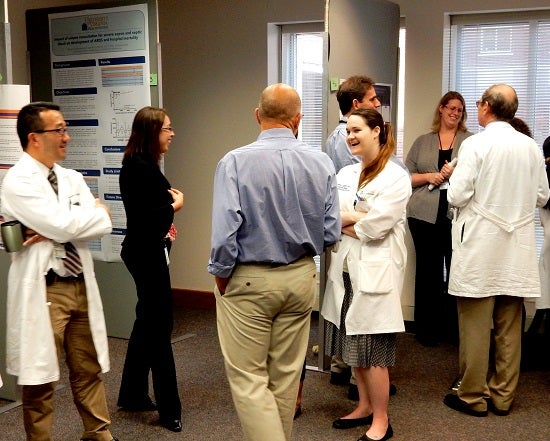About
Overview & Goals

Carey-Marshall-Thorner Research & Scholars Day, May 2015
Neuroendocrinology encompasses numerous biological processes critical to whole-body homeostasis, including metabolism, energetics, and weight maintenance; regulation of water/electrolyte balance, blood pressure, and vascular function; and behavior. Neuroendocrinology is also integral to growth and development, reproduction, and aging. As such, neuroendocrinology is at the heart of major health-related issues such as obesity, diabetes, cardiovascular disease, and infertility. The primary goal of the Research Training in Neuroendocrinology T32 Program at the University of Virginia (UVA) is to provide outstanding early-postdoctoral research training for tomorrow’s independent scientists in the various fields of neuroendocrinology.
We strongly believe that hands-on performance of in-depth research side-by-side with an experienced mentor, in the context of a rich and nurturing environment, is the most important component of our program. We offer an array of research opportunities, all related to a common theme: interactions among endocrinology/metabolism and neurological systems. Our current mentors include 12 PhDs, 7 MDs, and 4 MD/PhDs, from nine different departments. Mentors have a wide range of interests but all are highly collaborative, and are associated with an average of 2.9 extramural grants that provide $1.93 million in direct costs annually. Because we believe that the quality of mentorship is the most important factor in the long-term success of our trainees, we include only mentors who are fully dedicated to postdoctoral training, and have developed a robust, multilayered mentorship structure.
Research training is enriched by a structured educational framework designed to impart the full complement of knowledge and skills necessary for a successful research career. Along with formal coursework, training in the responsible conduct of research, and career development sessions, educational opportunities include the following:
- program seminar series
- combined basic/clinical journal club
- research-in-progress conference
- didactic lecture series
- “grant brewing” sessions
- grant-review program
- trainee research symposium
The program is overseen by an executive steering committee that makes training grant appointments, formally evaluates each trainee’s progress, and manages program design and direction. To ensure a high level of oversight, a review committee assesses the operation and performance of the program and makes formal recommendations regarding improvements. The Research Training in Neuroendocrinology Program has a strong record of training scientists who have gone on to establish successful careers inacademic, medical, pharmaceutical, government, and biotechnology settings. Program participants have been highly successful in obtaining independent extramural funding to support their training; in addition, 77% (17/22) of program fellows supported in years 16 to 24 of the training grant went on to secure (and have remained in) full-time faculty/research positions. This strong overall record underscores the rich research training opportunities, the devoted faculty preceptors, and the stimulating training environment offered by UVA’s Research Training in Neuroendocrinology Program.
